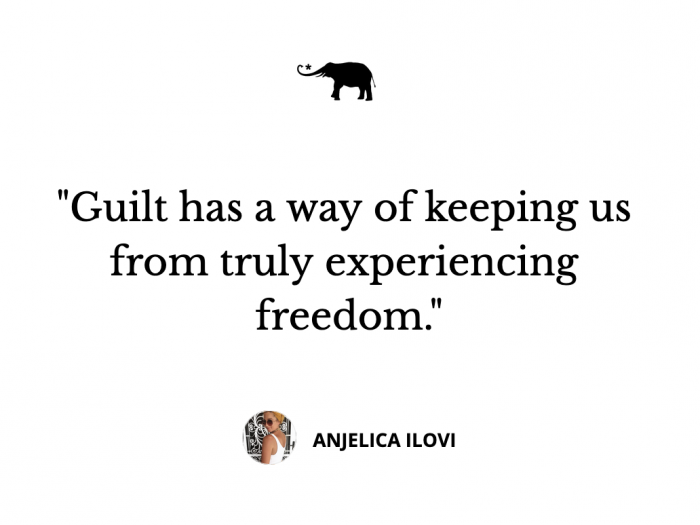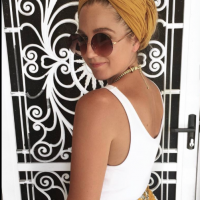When my father was five years old, my Yaya, Papou (grandma and grandpa in Greek), and his siblings made their way to Australia.
Escaping a life of war and trauma, they started here with nothing. They had no choice other than to grind to put food on the table and a roof over their heads. With the little they had, my Yaya would cook hearty soups, and bread became the staple tummy-filler. (We still eat those soups today.)
She was the ultimate saver and invested her hard-earned coin into owning the family home and paying it off in full. Even after owning her land, she continued to save until her last breath.
She knew her why. A sense of security, perhaps?
My parents met in church. This church had extreme views on how a Christian “should” be. Such as discouraging preachers from owning property, having too much money, and women being independent. Growing up, we didn’t have much; we lived simply, and it was a strain on our family.
As a young girl, I had a natural pull toward style and fashion. Although I went through the cringy years of rolling around with two strands of hair in front of my face and plucking my eyebrows to a mere thread, I knew my kicks. I really wanted the latest Nikes.
When I first got a job at McDonald’s, I was 13 years old. Earning my money was like winning the lottery. I went out and bought four pairs of shoes in one go—three of the same heel in red, white, and black. And white Nikes. Unfortunately, my mum saw it as a waste of money (I see her point; I had nowhere to wear my heels). But my excitement became saturated with guilt.
I became an avid saver, just like my Yaya. Dad taught us to save up for things we wanted rather than get credit cards or be in debt, which I have lived by until this day. Acquiring patience has cultivated a deep appreciation for the things I do own because, as you know, when we have to wait for something, it becomes more valuable to us.
But, on the flip side, I became afraid to spend my money. There was no balance. Whenever I spent money, I had to justify it to myself. Over time I became obsessive with minimalism, decluttering, and holding onto my money. While I also have environmental reasons for minimalistic living and prefer second-hand, I became the ultimate minimalist and “declutter queen.” I found solitude in this lifestyle. I could pass off my lack of purchasing for a valid reason: minimalism. I also kept telling myself I didn’t need much money to be happy.
The Christian doctrine I was bought up with did not encourage women to seek out careers, be independent, and live joyfully. Women were to be stay-at-home mums, wear dresses (never pants), and serve their husbands. The emphasis was on good deeds and giving yourself (overly) to others, often at the expense of your well-being and personal security (i.e., career, money, owning property).
The combination of teachings from family and the church meant I entered adulthood feeling guilty—all the damn time—for everything and anything. I lived by the books for a while. The career. The relationships. The saving. I tried my best to fit in and follow in the steps of others before me…until my body couldn’t take it any longer, and I became really sick.
Carving out an entirely new path in opposition to the belief systems and traditions I was taught came with inner turmoil. But choosing to face the anguish and make peace with what does not serve me showed me that the guilt I was experiencing was misplaced guilt. As I deepened my understanding of misplaced guilt, an acquaintance pointed out a really valid point. I couldn’t bullsh*t myself any longer.
He said,
“Is minimalism and saving a way to avoid spending money because of your guilt? Because if it is, that is the energy you’re putting out there—that you are not allowed to spend on yourself and enjoy your earnings. When, in fact, you are allowed to enjoy what you earn.”
I’d never heard such a statement before, but my core resonated with it. I knew, on a core level, I wasn’t doing anything wrong by enjoying life.
So, why did I have this guilt cloud hovering over me?
The first realization was that I was carrying around other people’s belief systems due to the life they experienced—what was passed onto them. I also felt shame for fully embracing and living my highest dreams, knowing my Yaya and Papou suffered at the hands of injustice. I didn’t feel deserving.
The hardest thing to acknowledge was the cowardly mentality I was allowing to dictate my life. Here I was thinking, “I am being humble,” when really I was squandering my blessings and seeing them as a curse.
The stories we tell ourselves may be justifiable and believable if we never take the time to ask “why?”
Our why may end up being completely different from those before us. But guilt has a way of keeping us from truly experiencing freedom. It’s such a heavy emotion alongside shame. People use it all the time to control others. And we use it to control ourselves and limit our growth.
Flourishing in life and taking advantage of opportunities in this current climate can be filled with all sorts of anxieties. We may feel we have to explain or justify ourselves for the freedoms we have today—for embracing the advancement of society and technology. But we don’t. And this truth can be a hard pill to swallow for some of us.
We are allowed to be free, enjoy life, and receive blessings (even if we didn’t rough it like our ancestors). We also cannot minimize the trials and things we have to go through personally, even if they don’t look the same as those before us.
As much as my Yaya believed in hard work and saving until her final days, all she wanted to know was if we were happy. She barely spoke a word of English, and whenever I went to visit her, she would simply ask, “Are you happy?” I’d always respond, “Yes.” And she’d nod her head and reply, “Good.” She was relieved and satisfied. Her grandchildren were okay. The day before she passed, I showed her hiking photos, and she smiled.
And, for the last time, she asked, “Are you happy?”
She left the earth peacefully, knowing we were.
I don’t think my Yaya would be pleased to know that I felt guilty for my life and the different opportunities we have today because of what she went through. I know if I was a grandparent, I would be over the moon to know that a choice I made resulted in my grandchildren experiencing freedom.
I am here because of her and my Papou.
As millennials and future generations (and I’m sure other gens), we may feel undeserving of living differently and that we don’t measure up to what they had to do for us. We may have adopted mindsets that are based on their way of living—in the past. However, the way things were, are not the way things are. We can start questioning and changing the typical generational expectations or norms. We have that right to; that is part of evolving. And we need to acknowledge that while sacrifices were made and some teachings passed down are useful, some are also restrictive, controlling, and disempowering.
As a woman growing up in a church that condemned women from being independent, you can imagine the personal struggle that has come with pursuing my life. But questioning those belief systems and choosing new perspectives that enrich my life and the lives of others has been worth the mental battle. And although the beliefs I grew up around twisted and manipulated many biblical teachings to suit their own agenda (which I’m still healing from), I now see certain ancient teachings with fresh eyes.
I’ll finish with this:
There’s an old story in the bible about the Israelites entering the Promised Land—a place of milk and honey. They were freed from slavery in Egypt. Unfortunately, they ended up circling the desert for 40 years before finally claiming the promised land. They could have entered, but it would have been a tough journey. So while they circled in the desert, they returned to old habits rather than believing freedom was indeed possible—and it was theirs.
The Israelites could have chosen the tough path, but it may have meant facing the discomfort of guilt and not feeling worthy. After all, when you are used to being a slave, freedom can be overwhelming. Although there are different interpretations to this, history shows us we don’t naturally feel worthy of our blessings if generationally we have suffered. Meaning trauma and outdated belief systems are passed on to our children and their children.
Unless we heal.
One way to start your healing and make peace with generational or religious guilt is to start by simply asking yourself and others:
“Are you happy?”












Read 12 comments and reply